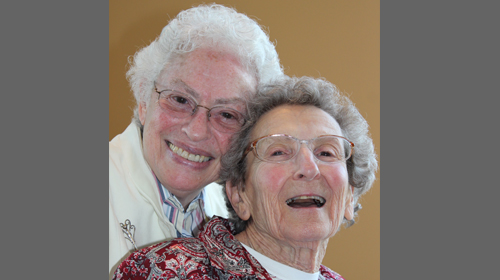What North Carolina's Refusal to Recognize the Marriages of Same Sex Couples Really Means


Think of what it would mean for someone who has been with their partner for decades to confront losing a spouse, while the state insists they're not really married. That's exactly what many same-sex couples face in North Carolina.
Today, we filed a new lawsuit seeking relief for three North Carolina families in desperate situations.
Our clients -- three lesbian couples in long-term, loving, and committed relationships -- include a decorated war veteran and others who honorably serve and contribute to their communities in numerous ways. Yet North Carolina law treats them as second-class citizens, denying them respect of their marriages.
Our new plaintiffs are Ellen ("Lennie") Gerber and Pearl Berlin, Lyn McCoy and Jane Blackburn, and Esmerelda Mejia and Christina Ginter-Mejia.
Because of their age and medical conditions, all three have a substantial fear that one of them could pass away before their marriage is recognized by North Carolina, depriving them forever of the dignity and social recognition that state-recognition would bring.
Lennie and Pearl have been together for 47 years and were married in Maine. Pearl is 89 years old and was hospitalized twice last year.
Lyn and Jane have been a couple for 22 years and were married in the District of Columbia in 2011. Jane has Stage IV breast cancer and is currently undergoing chemotherapy and other treatments.
Esmeralda and Christina have been together 19 years and were recently married in Maryland. Esme is a decorated retired Army major. She left the Army after being diagnosed with cervical cancer. Four years later, she received a second cancer diagnosis for a tumor in her left lung. She has undergone many procedures, including surgery to remove the upper lobe of her lung and three ribs and a liver transplant. When Esme has been hospitalized, Christina has been unable to take family leave to care for her because the state does not recognize their relationship. And as a veteran, Esme's legally recognized children would be entitled to significant benefits. Because the state will not allow Esme to adopt the child she and her spouse have been raising for the past seven years, he is not considered her legal child and is thus ineligible for these protections.
These three families live in a constant state of uncertainty and fear about their ability to exercise their proper role as each other's spouse and medical proxy or to be allowed to stay with their spouse during medical procedures and emergencies. If any were to die, their relationships with their spouses (and, for one family, their child) would never be legally recognized in North Carolina.
Having lived in a loving and committed relationship for decades, our clients should not have to face the end of life (and, for the surviving spouse, the thought of losing their life partner) with the knowledge that their community refuses to recognize the worth and solemnity of their relationship in ways it does for others. They deserve all the support they can get, not the indignity and grief of knowing their home state treats them as legal strangers.
Because of the urgency of their specific situations, we filed suit seeking a preliminary injunction requiring the state to respect their marriages. At the same time, we are also seeking urgent relief on behalf of one of the families in our earlier lawsuit on behalf of six couples raising children in North Carolina.
In our earlier case filed in 2012, plaintiffs Shana Carignan and Megan Parker, along with their son Jax have been waiting for a decision about whether the state can continue to disregard their marriage. Jax, who was four at the time the lawsuit was filed, faces serious developmental delays due to cerebral palsy. Because North Carolina does not respect their marriage or allow two unmarried adults to adopt a child, Shana is unable to adopt her son and cannot cover him on her health insurance. Jax desperately needs medical treatments that the couple cannot afford to pay for on their own but would be covered by insurance if Shana could adopt Jax. As each day passes, his parents fear that Jax is missing critical opportunities for intervention that would have a profound impact on his development.
Since the Supreme Court ruled that the federal government could no longer refuse to recognize marriages of same-sex couples in United States v. Windsor, nine federal courts across the country have concluded that excluding same-sex couples from marriage, or refusing to recognize their valid marriages, is unfair and unjustifiable. We and our clients are hopeful that the district court in North Carolina will soon join this chorus of decisions striking down such bans as unconstitutional.
Learn more about marriage for same-sex couples and other civil liberty issues: Sign up for breaking news alerts, , and .

